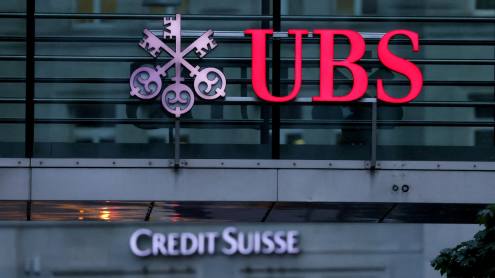ICELAND ROUND TABLE
The participants:
Brian Caplen editor, The Banker
Árni Mathiesen minister of finance, Iceland
Hreidar Már Sigurdsson CEO, Kaupthing
Bjarni Ármannsson CEO, Glitnir (formerly Islandsbanki)
Halldór Kristjánsson CEO, Landsbanki
Thordur Fridjonsson CEO, Iceland Stock Exchange (ICEX)
Paul Rawkins sovereign debt analyst, Fitch Ratings
Richard Thomas senior director credit research – banks, Merrill Lynch
Matthew Hegarty European credit research analyst, Barclays Capital
Cian Walsh emerging markets portfolio manager, Blue Bay Asset Management
l This round table was sponsored by the Icelandic banks represented but edited independently by The Banker
When Fitch revised its outlook for Iceland’s sovereign rating from stable to negative in February, due to its overheating economy, large current account deficit and rising external debt, the country hit the headlines. The value of the krona fell, as did the stock market and government bond prices, and some forecasters expect gross domestic product (GDP) to decline next year. But have the analysts – who also criticise the rapid expansion of the banking sector – got it right or are they too negative? Brian Caplen: Despite the problems of the past few months, the Iceland economy is showing enormous flexibility. Perhaps the finance minister would like to comment on this. Árni Mathiesen: I would summarise the economy in one word: sound. We have been going through a period of great change, reforming our economic structure. We have been privatising, making the business environment more favourable and lowering taxes.
Foreign investors want to come to Iceland, especially to invest in the power and aluminium industries. These investors usually build large projects, which causes some disturbances in a small economy like ours, but we can’t choose the timing. To counter that, we have tried to make our economy flexible so that we can adapt to different situations. Our public finances are sound. We had the largest surplus in Europe last year and we expect a similar-sized surplus this year.
Árni Mathiesen, Iceland’s finance minister
The government intends to carry on similar fiscal policies and stimulate further interest from foreign investors. But without any major projects on the horizon, the outlook for GDP is that, following 5% growth this year, we will have 2% next year and then 2.5% for each of the following two years. The krona was overvalued. That put a strain on our export industries, so the currency was bound to correct itself. The krona is now close to its historical equilibrium, which will allow our traditional industries and new ones, like the finance sector, to continue growing.
BC: I don’t think anyone at this round table will argue with you on the structural reforms that have made the economy more dynamic. But what analysts are talking about is whether things have moved too fast and created asset ‘bubbles’ in the market. We accept that government finances are stable but what about private sector finances?
AM: We have the same kind of surveillance approach for the banking system as in the rest of the European Economic Area. I don’t have any reason to doubt that the structure of bank finances is solid or that it can withstand dramatic changes in the exchange rate and on the stock exchange. But when banks grow as fast as they have in Iceland in recent years it is bound to attract some attention.
One bubble we could talk about is the housing market. There you could say we went too fast and too far in a short time in making structural change, and house prices have gone up. The housing market is now slowing and I imagine it will stabilise over the next few months. We expect people’s disposable incomes to increase this year and next year so I don’t foresee a situation in which the public can’t sustain their investment in housing.
BC: Paul Rawkins wrote the fateful Fitch report in February, which was critical of Iceland’s overheating economy and current account deficit. It made the markets sit up and take notice. Paul, is there anything that the minister has just said, or anything that has happened since February, to make you feel more comfortable with the situation?
Paul Rawkins: We still fear a hard landing in 2007. The minister speaks about the flexibility of the economy – that is a fair point. The floating exchange rate is working as it should and the rate has dropped. We expect the current account to start correcting soon. When that corrects, we expect the borrowing to come off, and we hope that some of the rebalancing we have seen will start to level out.
We wrote the report because we were concerned about the various bubbles in the economy, that the exchange rate was too strong, asset prices were way above trend and private credit growth was high.
|
| Fitch uses a model for its reports that focuses on potential indicators of financial distress in an economy. When we used it for our last report, all the warning lights were flashing red. The risks had gone beyond what we expected. The speed and the depth with which the market responded to our analysis suggest to us that a lot of people were nervous. We had a conference call the day after the report. Normally, we get 35-40 people on such calls – on this one we got 225. We touched a raw nerve. |
BC: Is there anything on the policy front that could be done that is not being done?
PR: Last year, the general government debt did swing into a hefty surplus but the government wasn’t budgeting for that, and our criticism has been that the ministry of finance has not sent a strong enough message. The policy is slightly pro-cyclical at a time when the economy is growing so fast. The government still intends to carry out its promise of tax cuts, which sends out an inappropriate message. This is not the time for tax cuts when there are such huge imbalances in the economy.
We are also concerned that the central bank’s monetary policies are not having an effect because of what is going on in the mortgage market. People have very easy access to long-term finance.
BC: Can one of the bankers comment on the mortgage market?
Halldór Kristjánsson: Our analysts at Landsbanki agree with the ministry of finance’s latest economic outlook report, which predicts economic growth of 2% for 2007 and 3% from 2008-2010.
Prudently, the ministry does not include any prospect of foreign direct investment (FDI) in its reports until it is signed, sealed and almost delivered. But we work closely with foreign direct investors and can speak more freely about their intentions in Iceland. They have all been very firm in their intention to expand as power becomes available. Given the world situation with power costs going up, and power costs in Iceland staying relatively level, the likelihood of more FDI is very high. So we predict that economic growth in Iceland will be close to 4% in the next three to four years.
I mention this because some analysts are saying that there might be a recession in Iceland. I think that is extremely unlikely. I think we will have healthy growth that will be sustainable and consistent with maintaining economic stability. This is very important when you look at the operating conditions for the banks, at least for the Icelandic parts of their business.
On the mortgage market, following the last rate hike by the central bank, all the players raised mortgage rates. That, together with the demand and supply situation, has put a dampener on the rate of growth of the property market.
In relation to banking growth and whether it is sound, it should be borne in mind that the banks and their predecessors have all been rated by rating agencies since 1997 or 1998. That imposes a strong discipline on all of us with regard to maintaining healthy credit risk management.
We are all regulated by several regulators. Landsbanki is regulated by six regulators in Europe, not just our own regulator. That should give additional comfort. It shows that we are prudent in our operations, that we are able to withstand stress factors and that we operate with very sound capital adequacy ratios.
Richard Thomas: I think the mortgage market in Iceland is a good indication of how misguided the banks were. They entered a new market, albeit at the suggestion of the IMF, and competed aggressively to buy market share in an area where they have no hope of being price-competitive because they are competing against the Housing Finance Fund (HFF), which is government-owned and funded.
Their costs of funding were only matched by the net interest income. They were barely making a profit and that’s before allocating costs and provisions. I think this is unsustainable. In addition, they did not, and do not, have the long-term funding instruments to support that, with the exception of Landsbanki, which has sold some of its assets to the HFF and got the HFF to do the funding.
The banks’ success depends on a wild contingency, which is the exit of the HFF from the market. So mortgages, which should be a great source of strength and are a source of strength for almost every other bank globally, are a source of weakness for Icelandic banks. I understand why the banks went into this market but it was done too aggressively. It shows a huge lack of discipline in terms of economic capital and return to shareholders.
Hreidar Már Sigurdsson: We do not regret entering the Icelandic mortgage market the way we did. We fund our mortgages by a covered bond programme that enjoys the highest credit rating. We have already issued €500m in bonds in Europe to fund residential housing loans in Iceland. The bonds are rated Aaa by Moody’s, which is the same rating given to government-guaranteed entities.
We are not worried about the housing market in Iceland. Prices are currently stabilising and our average loan-to-value is about 60%. We have granted more than 9900 mortgages and currently only about 10 of them are in 90-day default, which reflects the high asset quality. The government is now evaluating ideas of how to change the structure of the HFF so I think the role of the banks will only increase in the mortgage business in future.
We are also fairly comfortable with the development of the Icelandic stock market, although it increased 60% last year and started the year strongly. The correction that followed did not have a material effect on us, as reflected in our first-quarter results.
AM: People can still afford to service their housing debt. The banks all showed record profits for last year and the first quarter of this year. There are no indications that they are doing badly in the second quarter. On all these issues, and on government finances, taxes and private consumption, there are a lot of question marks but no blinking red lights that we are worried about.
BC: That’s interesting, because Fitch says that all its red lights are on, and you are saying none of yours are on.
RT: The central bank of Iceland published a financial stability review last week, which is somewhat at odds with the finance minister’s picture. It talks about caution being needed in the housing market. It says that a soft landing for the economy is not assured and advises all banks to continue to be cautious.
AM: That’s largely what I was saying.
RT: You were painting a rosier picture.
AM: I was saying how individuals can withstand the pressure and we will not get a crash in the housing market. But there are question marks, so what I said is not at odds with what the central bank is saying.
Thordur Fridjonsson: I think the most important issue is that of private foreign debt. The increase in private foreign debt should be seen in the light of the transformation of the economy in the past 10-15 years and the overseas acquisitions by banks and other Icelandic companies.
|
| Other countries have higher external debt than Iceland. The UK and Switzerland are examples, partly because they have large external banking sectors. The Iceland economy is small, banks have been expanding very fast and we have a large external banking sector. Analysts have focused on the risk attached to total foreign debt but I don’t think it is very relevant. You have to look at the asset side and there is no reason to believe that there is a significant risk attached to this foreign debt. |
The economy has many strong points, like fast growth, the infrastructure, pension funding, solid fiscal balances and its human resources. We have to admit that we have not been very good at controlling inflation or the business cycle. What is happening now is a repetition of what happened at the beginning of the decade but it does not mean that the fundamentals of the economy are in any way shaken or that future growth is threatened. BC: The picture building up here is, on the one hand, a positive one, where there will be long-term beneficial outcomes – Icelandic companies going overseas to diversify earnings, and foreign investors coming in. But, on the other hand, this is creating short-term problems. There is a tension between long-term strategy and the short-term effects. Have things gone too fast?
|
| Bjarni Ármannsson: Those concerns can be substantiated. If you invest in Iceland, you take a long-term view and accept that the economy is more cyclical than most, even if you manage fiscal policy well. But the fundamentals are right. The Iceland economy is in stark contrast to some of the EU-15 – a fiscal surplus has been in place for a long time, there is very low unemployment, purchasing power has increased 11 years in a row, and we have a fully funded pension system so there is no looming pension crisis. Basically, the issue we face is managing growth, rather than creating it. |
Cian Walsh: I am not investing in Iceland, but I have been following it quite closely for the past 12-18 months. Blue Bay Asset Management has $6bn in assets under management across investment grade, high yield and emerging markets. Iceland is not a country that fits for us – it falls between developed and developing economies. At the moment, the risk/reward ratio for Iceland is not in its favour. We would not get paid for the risks or the volatility involved. There is potential, though, compared with some of the emerging markets that I look at. There are a lot worse stories out there. Medium to long-term, Iceland looks fine. Its current account deficit is big but there are more aluminium projects coming on line that will help to reduce it. The worry that I have is the currency volatility, driven mainly by the deficit on the current account. This volatility is possibly going to reduce FDI in the next few years, which will affect growth.
Matthew Hegarty: One of the issues of investing in Iceland is that in the cash bond market there has not been a lot of liquidity, so where we have seen most activity has been in the CDS [credit default swap] market. What we have seen recently is CDS spreads tightened, implying that credit worthiness has improved. But part of the driver is issuance of structured bonds. CDSs on Icelandic banks are being included in these bonds, which artificially drives down CDS spreads.
We are concerned about the extent to which debt has driven a bubble in the stock market. There is a lot of lending to investment companies. It is an opaque world and there is a high level of risk-taking in the investment companies and the banks are exposed.
TF: There has been exceptional growth in the stock market in the past four or five years. At ICEX, we don’t make any evaluation of share prices but we are aware of how the analysts are assessing the market. If you suspect there is a bubble, the first thing to check is the price/earnings ratio. The p/e ratio is about 11 now, which is relatively cheap compared with other markets. If you have a bubble in the market you are talking about ratios of 20/30 or 60/70.
HK: Analysts say that Icelandic banks and other companies should provide more information so that we can be judged better about how capital is allocated. But we are all IFRS [International Financial Reporting Standards] compliant and provide information according to those standards. What more can they ask of us?
RT: Yes, we do have some concerns about the way in which some investments are being counted by Icelandic banks. It is not that we want more information than anyone else gives, it is just that the driver of the Icelandic banks’ profit has been capital gains and financial gains, and there is no visibility about how this is generated. We don’t know what’s in the investment portfolio; we’ve never been told by any of the banks what their investment policy is, how they are going to make money out of it or how it is sustainable.
What I would like to see in the Icelandic banks’ IFRS statements, which is something that practically every other European bank gives us, is where they allocate capital and how much money each discrete business makes. We don’t have any knowledge about how Icelandic banks allocate capital.
BC: We know that Kaupthing has doubled in size for each of the past eight years, with massive overseas acquisitions, and it’s that sort of growth that has generated some of the criticism.
HS: If history has taught us anything, it is that Iceland has a volatile economy. Our strategy over the past eight years has been to grow our business outside of Iceland and we have successfully executed that strategy. We’ve built a strong platform in northern Europe through strategic acquisitions, coupled with robust organic growth.
Part of the CEO’s job is to compare the performance of our bank with other international banks. That’s why I know we’re at least as transparent as any other European bank. We give detailed breakdowns of our balance sheet, such as portfolios by sector and geography, data on our investment portfolio and data on the markets and instruments we trade in, information you would not see from many other banks. So it should not be difficult for analysts to understand our business, how we are generating income and where we are making our money. However, while we have been rapidly building our platform it has been challenging for analysts to make historical comparisons between years, which is quite understandable.
BC: Would the finance minister like to conclude by giving us the government’s view on intervening should an Icelandic bank get into difficulties?
AM: I have not seen any indication that any are likely to get into difficulties, but certainly the central bank is important as the lender of last resort. We talk a lot about the downturn in 2001 and 2002 but we should not draw too many comparisons with that because the economy has changed such a lot since then.
We expect a dramatic change in the current account balance next year and the year after, driven by exports because of the aluminium industry. At the same time, the fishing industry, which has been suffering from the high exchange rate, is turning around. So when one part of the economy has to consolidate, another part is ready to expand.
About 70% of the companies on the stock exchange get a major share of their income from activities abroad, so they are not so reliant on the economic cycle in Iceland. It is the world economy that is going to affect their performance and the world economy is doing well.
I am positive about our immediate future. I am glad to hear that Cian Walsh of Blue Bay is positive about the medium and long term, so if you put those two views together…
We have certainly been under scrutiny but we welcome that scrutiny. There are lessons to be learned from it: we have to be more organised in telling our story to the world and what we are doing in the financial sector and the other important sectors.














